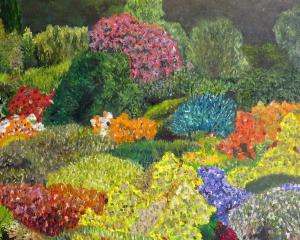The most fun part of writing is coming up with the idea for a story, according to Karen Trebilcock.
She also loves it when people say they can't put her books down and have to keep reading to find out what's going to happen.
"I want to take people for an exciting ride," the Dunedin author says.
This year's Creative New Zealand Children's Writer in Residence at the University of Otago College of Education, Trebilcock has published three young adult novels under her pen name, Ella West.
She describes her Thieves trilogy as adventure thrillers set in today's world, but with a science fiction element.
"I want them to be so a kid could read them and think `if I woke up one day and was able to do that, this could happen to me'."
People always need stories and story-telling becomes more important as we become hesitant about the future and where we are heading, she says.
Absorbed, the book she has been working on during her residency, is set in the near future, during peak oil when the price of petrol has risen to more than $7 a litre.
"In the book, the streets are clogged with cyclists and pedestrians and the buses are full.
It's interesting to imagine a world when we can't use petrol and global warming is starting to affect our lives," she says.
It's about 18-year-old Brooklyn, from Auckland, who has come to Dunedin with her high-school friends who are going to university.
However, she's a junior reporter on the local paper, and discovers one of her friends is caught up in questionable activities.
The story is about her search for the truth about what's happening and her attempts to stop it.
Trebilcock, who grew up in Invercargill, draws on her experience as a 17-year-old junior reporter on the Southland Times - the feeling of being very new in a very competitive workplace that wants things straight away and having to write fast, she says.
She has returned to journalism from time to time over the past 25 years as a way to earn money, and she even funded her university studies by working as a journalist.
"It needs good writing skills and you get out and see people.
It's also rewarding to see what you've written published next day, and you have the feeling they need your writing to fill the white space in the paper," she says.
"The worst thing would be if you wrote and wrote and wrote and never got published, and that's the hardest thing to justify what you are doing.
You don't write for yourself.
You want other people to enjoy the story."
Her first book, written in the evenings while living on a West Coast dairy farm, and stashed in a box for some years, was published by Longacre after the family moved to Dunedin in 2003 for educational opportunities for their two sons.
Now coming to the end of her six-month residency, she has many irons in the fire.
She is waiting to hear from three publishers, about applications for two grants, and has two plays she hopes to have staged and perhaps even made into film scripts.
"The waiting is probably the hardest thing for a writer. Meanwhile, you start your next book," she says.
Creative writing can also be lonely.
She treats it as a business and sits down each morning to write 3000 words.
Keeping a daily log makes her feel she is getting somewhere.
"If you you write 3000 words a day and it's a 55,000-word book, after a certain time you'll have the book. It becomes as simple as that."
However, she says she dislikes the proofreading and rewriting that is often required, and the horror of finding a missed full stop or wrongly spelled word.
She also writes plays.
With a background in amateur theatre and experience teaching speech and drama, she has a good understanding of what can be done on stage, she says.
"I love theatre; I always loved it as a kid.
"It's great writing novels but you don't actually see a person read your novel. You never get immediate feedback, but in a theatre you can see the people in the audience laughing and enjoying the story."
She hopes her play, The Middlemarch Singles Ball, which was well-received in a workshop and reading last year and was a finalist in the Adam New Zealand Play award, will be staged next year.
In it the organisers of the ball realise to their horror that all the tickets have been sold to women.
Previous balls have been so successful all the men have been married off, even bald old Percy who lives with his mother.
Some Auckland men are willing to come and be trained to be like farmers, but they want to ride horses, sleep under the stars and drink Speight's instead of crutching sheep or fencing, she says with a laugh.
Her next goal is to finish a contemporary adult novel set around Cargills Castle, in Dunedin.
Once you've written an adult novel, a whole lot of other doors open up for you, to do with funding and opportunities, she says.


![Marama [detail] (2025), Whaka Oho Rahi and Benhar clay, salvaged glass from Ōtepoti harbour and...](https://www.odt.co.nz/sites/default/files/styles/odt_landscape_small_related_stories/public/story/2026/02/1_jess_nicholson.jpg?itok=q3eXu3xD)










